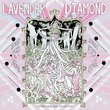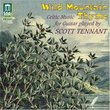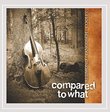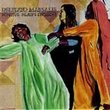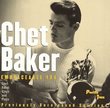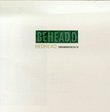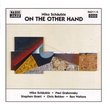| All Artists: Geirr Tveitt, Bjarte Engeset, Royal Scottish National Orchestra, Havard Gimse Title: Tveitt: Piano Concertos Nos. 1 & 5 Members Wishing: 0 Total Copies: 0 Label: Naxos Release Date: 4/17/2001 Genre: Classical Styles: Chamber Music, Forms & Genres, Concertos, Historical Periods, Classical (c.1770-1830) Number of Discs: 1 SwapaCD Credits: 1 UPC: 747313507726 |
Search - Geirr Tveitt, Bjarte Engeset, Royal Scottish National Orchestra :: Tveitt: Piano Concertos Nos. 1 & 5
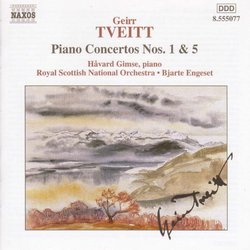 | Geirr Tveitt, Bjarte Engeset, Royal Scottish National Orchestra Tveitt: Piano Concertos Nos. 1 & 5 Genre: Classical
|
Larger Image |
CD DetailsSimilarly Requested CDs
|
CD ReviewsWhere did this come from? Joshua Grasso | Oxford, OH USA | 11/12/2001 (5 out of 5 stars) "Wow! This is one of the most exciting classical discs I've discovered in the past few years. Hats off to Naxos for recording such out of the way pieces as Tveitt's magnficient piano concertos. Both concertos are wonderful, though nothing can quite surprass the magical, poetic opening of the First Concerto, which reminds me slightly of the wistful opening of Prokofiev's Second. And like Prokofiev, the concertos combine a very personal melodic stamp with fiery, dramatic episodes that could easily conjure up certain episodes of the Sagas (depending on how your imagination runs). Especially interesting is the opening of the 5th concerto, which seems on the verge of launching into Holst's "Uranus" from The Planets. The Royal Scottish Orchestra plays this music for all it's worth, and Havard Gimse is an amazing pianist, ideally suited to Tveitt's unique sound world. If you haven't heard of Tveitt or his music before, I would strongly suggest this disc, as there are virtually no alternatives in the market. And if you like this one, I also recommend his "A Hundred Hardanger Tunes," also on Naxos. A true find!" Rare Treasure Stephen D. Haufe | Clinton, Iowa | 06/06/2006 (5 out of 5 stars) " With some notable exceptions like the Korngold Left Hand, Sauer 1 , MacDowell 2, Stavenhagens, or Paderewski, post or late-Romantic piano concerti often disappoint me as derivitive, uninspiring, lacking in melodic originality, (the Brits love Brahms!), showpiece fluff, unfocused like the Britten, yet we continue a search thru them as if for a Holy Grail concerto that will fulfill needs or desires left partially unfilled by the "great" warhorses, a search perhaps also borne of the hope and belief the warhorses simply cant be the end of such a noble line. Well, in the Tveitt Concertos 1 and 5 many such hopes and beliefs are fulfilled. One kicks oneself for not discovering these works earlier, or tragically almost missing them entirely. One fumes that pianists with star quality like Andsnes play yet another Greig or Rach 3 instead. Tveitt was a virtuoso himself, premiering his 5th Concerto in 1934,in Paris,in a program in which he also performed Brahms 1 and Tchaikovsky 1! The composer-pianist has , of course, been the source of great concerti. Tviett is not derivitive. The concerti sparkle with original imagination and unexpected turns, are accessible and gorgeous, the piano handled as an integral instrument in the band with brilliant writing. Most importantly the concerti tug at the heart of the listener while addressing greater themes, in a conscious,communicative effort to bridge the gap between Nature , our natures, and a Creator, successfully finding that elusive mix of vision, emotion, and intellectual appeal always marking the great concerti, but largely absent in most concerti arriving on the scene after the warhorses. In fact, I now will find it hard to listen to the Greig,which sounds quite tired in comparison. The 1st Tveitt is haunting yet emotional,inspiring. The 5th shares similar qualities but with more extroverted writing, yet a slow movement that took my breath as few others since Beethoven 4's andante. If you are familiar with the Sibelius Symphonies 5,6,and 7, you have a sense of the expansive, contemplative, yet exciting and colorful world of these two Tveitt concerti, works I suspect Sibelius would have liked to write himself, but Tveitt more nimble in his expressions. Rautavaara speaks in more abstract terms than Tviett, relying more on sound and effect; Tveitt communicating thru the time-honored tradition of melodic prose. Yet both share a love of Nature, and humanity, and a belief in a Creator, and view music as a vehicle to bridge the gaps, learn, communicate with original voice, to question, not simply repeat old saws. This is communication that grabs your attention. It is Romantic music which avoids being merely pretty .The Tveitt and Rautavaara are works that are now important additions to my collection,pieces I will return to as often as I have the Brahms or Rachmaninoffs, confident they will bear and reward many re-hearings. Many thanks to those who reccomended Tviett and Rautavaara. At Naxos prices and quality, 4 concerti of this quality a steal. I still cant believe I never listened before!! Thanks for induging another long post. You did know what to expect,after all!" A splendid release G.D. | Norway | 09/29/2009 (5 out of 5 stars) "The story about the disaster that hit Geirr Tveitt in the early seventies, when a fire at his farm consumed most of his huge output (some say about 75 % of it, but several works once presumed lost have resurfaced later) leaving the composer a broken man for the rest of his life, is by now rather well known. Both Naxos and BIS have recorded the extant piano concertos (nos. 1 and 5, plus the reconstructed no. 4 and the Hardanger variations - while no. 3 was lost in the fire there exists, apparently, a radio recording from the forties, so a reconstruction isn't completely out of the question, and judging from the quality of the ones we've got, it would be a more than worthwhile project). The music itself is Norwegian through and through, heavily indebted to folk music if not using actual folk melodies. The music is rhythmically alive and contains some very strong themes; stylistically, Ravel and Bartok are brought to mind (so is Sibelius at times), but Tveitt was never less than his own man. The concertos are excellently laid out for the piano and the scoring is inventive and colorful.
The first concerto was in fact a student work, but one would never guess it given the quality and individuality of the material. It is compact, with an effective, rhapsodic first movement developed from a really remarkable theme. The second movement is a folk-melody-based scherzo (sort of) which shows the influences of Grieg, whereas the third movement uses material from the first to build up to an eminently satisfying conclusion. The fifth concerto is written on a larger scale and is more complex compositionally. It is also based on rugged and craggy folk-dance rhythms and themes; the faster movements are highly inventive and colorful, strongly infused with nature-drama (yes, this is music of snow-capped mountains and dark blue fiords shimmering in sunlight, but never gives any kind of picture postcard feeling). Stylistically, Bartok is again a point of reference, but even more so, perhaps, Prokofiev in his best piano concertos. The central movement is a dreamy, lyrical movement. The performances are superb, both from Gimse and the Royal Scottish National Orchestra under Bjarte Engeset. They are able to conjure up all the color and power of this music and play with real flair and sensitivity. The recorded sound is excellent as well, and given the quality of the music this disc deserves an urgent recommendation." |

 Track Listings (6) - Disc #1
Track Listings (6) - Disc #1